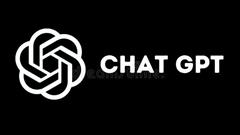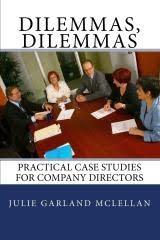Dear reader,
Welcome to the November issue of The Director's Dilemma newsletter. Every month this newsletter looks at a real-life board scenario and considers a range of responses.
This month we consider the appropriate attendance of non board members at board meetings.
To read this email in a web browser, go to www.mclellan.com.au/newsletter.html and click on 'read the latest issue'.
I hope you will enjoy the latest dilemma:
The Dilemma
Sophie is a project manager with a long and successful track record. She was delighted when she applied and was accepted to join the board of a Government Agency that delivers essential complex infrastructure projects.
The company has transparency and accountability as core values and all the senior executive team attend the whole board meeting to foster these values and demonstrate that the board is committed to them.
At the most recent meeting, Sophie asked a series of questions about a project that she believes could be at risk of delays and cost overruns. She felt that the CEO was not fully alert to the potential scale of the issues, and that the executive responsible, who was at the meeting, was evasive in answering. The board, however, took notice and asked for a deep dive into the project at their meeting after next.
The executive responsible for the project feels deeply offended and believes that Sophie has defamed him and questioned his competence in front of his peers and manager. He has asked the Inhouse General Counsel for advice on how to take legal action against Sophie.
The Chair has been informed and has called Sophie, asking her to propose a way to resolve this situation. What would you recommend her to do?
Suzanne’s Answer

This is an unfortunate situation that has arisen but should be resolvable without the need for legal action. Sophie is striving to show her diligence and demonstrate her area of expertise and the Executive feels like her/his professionalism and competency was questioned.
Board members have an obligation to appropriately question time, budget and other issues impacting, or with the potential to impact, successful delivery of a major project that is material to the organisation and high enough value to warrant the Board’s approval. This can be exacerbated in a Government agency, if the project has the potential to cause media and political interest if it is not delivered on time and budget, regardless if it is the agency or a contracted third party that has caused the delay or budget over-run.
However, perhaps the questioning might have been more managerial in nature rather than at a non-executive level. Perhaps also the Executive does not fully appreciate a board member’s role to ask questions and possibly the Executive has taken the questions rather too personally as opposed to acknowledging that part of the Non Executive Director's role is of “challenging, questioning and monitoring the CEO and senior management” (AICD).
Whilst bringing a fresh, independent and obviously enthusiastic perspective to the Board’s consideration and decision making, next time Sophie could perhaps ask a few strategic questions and then in the in-camera session part of the Board meeting raise her concerns and suggest a “deep dive".
The Chair could have a quiet conversation with the CEO that management or possibly a sub-set of management could benefit from undergoing some governance training to better understand the role of the Board and/or suggest that the CEO lead a discussion with her/his executive on the role of the Board.
In the immediate future, I would recommend that Sophie have a discussion with the Chair along the lines above and suggest that CEO have a conversation with the Executive about the issues described. Sophie might also offer to have an informal discussion with the Chair, CEO and the Executive.
Suzanne Jones has held senior executive & non‐executive roles (as Chair, Deputy Chair, board member) involving transport, energy, infrastructure planning & delivery, sustainability, resource management, property development, tourism and vocational education. All have involved considerable stakeholder engagement often in highly regulated environments. She is based in Sydney, NSW, Australia.
Julie's Answer

Sophie has likely not defamed anyone, but could be guilty of bullying or harassment. It’s a common misconception that board members can ask as many questions as they want during the meeting. They can’t. It’s counterproductive.
A director should ask enough questions to identify an issue, and potentially assess the scope, then it is time to ask for the matter to go back to management with subsequent reporting to the board in a timeframe that is appropriate for the level of risk and the expected speed of developments.
Once you have asked the questions that the executive team can answer whilst in the meeting, you are not adding any value, risk getting incorrect answers, and have started to interrogate and torture, rather than challenge and enhance, your executive.
A good chair would have intervened, gently, when the answers started to sound ‘evasive’, to shut down the discussion. Good board colleagues might also have stepped in, especially as they would know that Sophie is new to the board and still finding her voice. But they didn’t. They used the opportunity she created to request a deep dive while letting Sophie be the ‘villain’.
Now Sophie needs to rebuild bridges. Her first step is to seek support from the chair while she reaches out to the CEO to rebuild a trusting and respectful relationship. That does not mean that she should cease voicing her concerns about this – or any other - project. She needs to learn to bring her CEO and executive team with her so that they perceive the benefit of her questions and feel respected and safe in her presence.
The board has given management a reasonable time to do some good work on responding to the concerns; Sophie can use that time to show her support and maybe help them.
Julie Garland McLellan is one of Australia’s most internationally acclaimed company directors and board advisors. She is renowned for her practical experience as well as deep governance expertise and qualifications. She is based in Sydney, Australia.
Murat’s Answer

Sophie should first and foremost clarify her previous collaboration with the executive responsible. A direct relationship between the project manager and the executive responsible, with the purpose of sharing concerns about the project should have happened.
In responding to this situation, Sophie should document her actions and communications carefully to maintain transparency throughout the process. By demonstrating her commitment to resolution and collaboration, she can contribute positively and reinforce the values of accountability and transparency.
First, she should reach out to the executive to express her sincere intention, clarifying that her questions were aimed solely at protecting the project's integrity and not at undermining his competence. An invitation to discuss his concerns in a private setting could help rebuild rapport.
Next, she should consider suggesting a joint meeting with the executive, potentially mediated by the Chair, to facilitate a candid discussion about the project and any miscommunications that occurred. This approach can help diffuse tensions and foster a collaborative atmosphere.
Sophie could also propose implementing a structured feedback mechanism between the executive responsible and herself. This can reinforce a culture of open dialogue and allow concerns to be addressed proactively. Such a mechanism may help alleviate future misunderstandings and protect individual reputations.
Murat Kaan Güneri started his early career in İktisat Bank and continued at Digital Equipment Corporation (DEC) where he carried the responsibility for the Human Resources and Organization Country Manager position as well as that for the Quality Management function. Murat has over 3 decades experience in executive search and leadership consulting and advises Türkiye’s top leadership talent on succession planning, executive talent and board development. Murat is based in Istanbul, Türkiye.
Chat GPT’s answer

Sophie, I understand this situation is challenging, but it’s crucial to approach it thoughtfully. Here’s a suggested course of action:
- Reflect and Assess: Take a moment to evaluate your questions and comments during the board meeting. Consider if they were framed constructively or if they might have unintentionally come across as accusatory. Understanding this will be important for your response.
- Open Communication: Reach out to the executive involved for a direct conversation. Acknowledge his feelings and express that your intention was to ensure project success, not to question his competence. This can help clarify your motives and open a dialogue.
- Engage the Chair: Propose a meeting with the Chair to discuss the situation. Be candid about your concerns and your willingness to resolve the issue amicably. Suggest mediation if needed, emphasizing your commitment to the agency's values of transparency and accountability.
- Document Everything: Keep a record of all communications regarding this issue, including your questions and any responses. This can be important for protecting yourself should the situation escalate.
- Focus on Solutions: When discussing with the board or the Chair, shift the conversation toward collaborative problem-solving. Reinforce your goal of ensuring the project's success and highlight the need for open dialogue in addressing risks.
- Learn and Adapt: Regardless of the outcome, consider this experience an opportunity for growth. Reflect on how you can communicate your concerns more effectively in the future.
By addressing the situation with empathy and professionalism, you can help mend relationships while remaining focused on the agency's mission.
Chat GPT is an artificial intelligence (or a pattern recognition, data analysis, and prediction engine). It resides in Cyberspace.
Experience Julie in Real Life
- 5 November in Sydney delivering a Writing Better Board Papers Course then attending the AI Fluency for Directors Course
- 7 November in Sydney attending a Gordon Directors’ Group meeting and then more AI Fluency
- 8 November panellist on a Board Direction webinar on due diligence
- 12 November facilitating Governance Institute courses on Risk Governance and Risk management frameworks
- 13 November presenting Writing Better Board Papers course in South Gippsland
- 14 November more AI Fluency
- 15 November facilitating Certificate in Governance course for Governance Institute in Parramatta
- 20 November online masterclass on identifying and managing conflicts of interest in the boardroom for BoardPro
- 21 November facilitating workshop on Building a Board Career and Being an Effective Director in North Sydney
- 29 November facilitating Governance Certificate course for Governance Institute in Parramatta
If you would like to attend one of these courses, reply to this email and let me know. Can’t manage a course at these time but still want some input? Try my YouTube channel
If you would prefer confidential advice or an in-house workshop for your executive team, please reply to this email and I will gladly provide.
Book review – Dilemmas, Dilemmas: Practical Case Studies for Company Directors by Julie Garland McLellan

If you enjoy this newsletter you will love this book. These real-life case studies assist directors to develop their judgement using current boardroom issues. Each case study is commented upon by three experts who provide insights into how issues may be addressed.
The need for governance responses to suit the organisation context, and the characters on the board, is highlighted by the diversity of views and insights from the authoritative international contributors.
Buy This Book at Amazon
Board reviews – Every board – just like every other team – needs to measure its performance if it hopes to improve. When your board next needs to conduct a performance evaluation or a governance review, please remember that I would be delighted to help. You can contact me at julie@mclellan.com.au.
Inspirational quote for November

If you would like to get started with your board’s review or some director development – give me a call.
Does your board need practical help? The scenarios in this newsletter are general, I work with boards and directors as a confidential mentor to provide director training and development, board performance reviews, and specialist training in writing board papers for executives. If you would like personalised service, please contact me.
This newsletter - If you have any ideas for improving the newsletter please let me know. If you are reading a forwarded copy please visit my website and sign up for your own subscription.
Suggestions for dilemmas - Thank you to all the readers who have suggested dilemmas. They are greatly appreciated. I will answer them all eventually. I could not write this newsletter without your help and without the generous help of all the experts who respond each month to the case studies.
Be a contributor - If you would like to attempt a response to the dilemmas for publication you will be most welcome. Simply reply to this email and let me know. I am always on the lookout for new talent from around the world so please reach out if that sounds like something you could do. I am also always grateful for the generous sharing of the current and past contributors. I couldn't create such an engaging newsletter without their help.
Spread the word - If you have read this far, I assume you enjoy the newsletter - please help me to reach more directors by sharing the newsletter with your board colleagues and suggesting that they also become subscribers or by posting a recommendation on my LinkedIn page to let others know that you find the newsletter valuable.
Let's connect - I use LinkedIn to share information about boards and directorship with my friends and acquaintances. If you use LinkedIn and we are not yet connected I will welcome a connection from you. You can find me at linkedin.com/in/juliegarlandmclellan.
Farewell until the next issue due 1 December 2024. I look forward to greeting you again then.
Enjoy governing your companies, it is a privilege!
Best regards,
Julie
